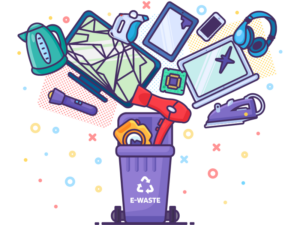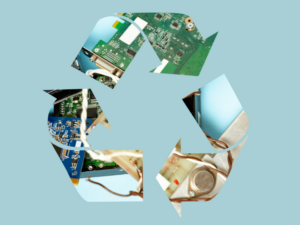E-waste is a growing issue that affects us all. While some might dispose of old electronic devices in the regular garbage, thinking it does not impact them, e-waste seriously threatens the environment and our health. These old electronics might be taken somewhere we can’t see, but that doesn’t mean they won’t eventually negatively impact our lives. Millions of tons of e-waste are produced yearly as people improperly dispose of their unwanted electronic devices.
With such a massive amount of toxic waste occurring worldwide, something must be done to protect our future and planet. If we don’t work towards stopping electronic waste from entering landfills, this problem will spiral out of control. Electronic recycling laws are essential for reducing the amount of e-waste in landfills.
Learn more about the e-waste laws and trends to watch for in 2024 and why we need legislation to help reduce e-waste.
What are the Federal Laws for E-Waste?
The United States is one of the world’s largest producers of electronic waste. Yet, unfortunately, there are still no federal laws that require people to recycle their used electronics. Much of the e-waste produced in the US also doesn’t stay there.
Most e-waste from the US gets shipped to other countries around the world, with China receiving most of these hazardous materials. However, there’s a silver lining. Recent legislative efforts, such as the US Congress’s move to ban e-waste exports to China, indicate a growing acknowledgment of the e-waste challenge and the need for responsible management.
Another positive is that while the US has no current federal laws mandating proper e-waste disposal, many countries globally have strict e-waste regulations. For example, The European Union has continued to advance its Waste Electrical and Electronic Equipment (WEEE) regulations, with newer directives focusing on the circular economy and aiming to enhance recycling rates.
Developing countries, especially in Africa and Asia, are also taking steps to manage the growing e-waste challenge. Initiatives such as the E-Waste Academy for policymakers and small businesses play a crucial role in these regions.
Do Individual States Have E-Waste Laws in Place?
The federal landscape might need a comprehensive e-waste mandate, but individual states have taken the initiative to address the e-waste challenge head-on. As of 2024, 25 US states and Washington, D.C. have implemented some form of e-waste legislation. These laws vary in scope and requirements, with some mandating the recycling of e-waste while others outright banning its disposal in landfills.
For instance, Pennsylvania is actively considering overhauling its e-scrap recycling program to make it more efficient and user-friendly. Such state-specific initiatives underscore the importance of localized solutions in the absence of a nationwide directive.
However, while these state laws are a step in the right direction, a significant portion of the US still lacks specific e-waste regulations. This disparity underscores the importance of businesses and individuals being proactive, irrespective of their state’s legal requirements. Whether mandated by law or not, responsible e-waste disposal is crucial for the environment and public health.
If you’re a business or organization looking to recycle old electronics in a state with e-waste laws, you must ensure you’re going through the proper channels. When it’s time for your organization to get rid of its IT equipment, look for a reliable ITAD company that recycles responsibly.
What Will Be Done Going Forward?
With no current federal laws in the US requiring waste management for e-waste, many people wonder what the future holds. Of course, there are many all over the world who are committed to reducing e-waste and are working towards creating more ways to educate the public and encourage them to prevent e-waste.
As we transition into 2024, the e-waste landscape is poised for several transformative shifts, both in terms of technological advancements and regulatory frameworks:
- Technological Innovations: A noticeable trend indicates that electronic waste in the U.S. is starting to decline due to technological innovation and changing consumer preferences. This either suggests that devices are becoming more durable or consumers are becoming more conscious about their electronic consumption and disposal habits.
- Easier and Cheaper Recycling: While some regulations, like the one that made electronics recycling easier and more affordable from January 1, 2023, have already been implemented, it’s essential to monitor their impact and effectiveness as we move further into 2024.
- E-Manifest System: The EPA’s e-Manifest system is set to announce user fees for fiscal years 2024 and 2025. This system aims to track hazardous waste shipments electronically, and the upcoming fees could influence the e-waste recycling industry.
- Global Movements: While not directly related to the U.S., it’s worth noting global initiatives that could influence domestic policies. For instance, the European Parliament has adopted a law for a common charger for mobile devices by 2024, aiming to reduce e-waste and promote sustainable consumer choices.
State-Specific Initiatives: Individual states might introduce or modify their e-waste regulations. Businesses and individuals must stay updated with their state’s specific requirements and changes.
Despite these upcoming changes, much work still needs to be done to prevent the e-waste problem from growing. While laws requiring all e-waste to be recycled are extremely important, there are more ways of tackling this issue. For example, one reason so much e-waste occurs is that devices become obsolete much faster than they used to.
In some parts of the world, there are efforts to help people repair their old divides to prevent them from being replaced so often. Making repairs more accessible can extend the lives of our devices and reduce the demand for new products, resulting in less e-waste. Many still need to be educated on the importance of recycling their old electronics. These are devices we use safely every day, so they may not realize the dangers they can have in landfills.
While it can take time for new legislation to come into place, many are concerned about e-waste and are taking steps to help reduce it. More people are becoming aware of the dangers of e-waste, and as education on the subject becomes more widespread, we could begin seeing more efforts to stop it. Making recycling services more accessible is also an important part of preventing e-waste going into the future.
Recycle Your Unwanted Electronics Responsibly
Regardless of what laws there are regarding recycling electronics, we all need to work on this to help reduce the amount of electronic waste and toxic chemicals from polluting landfills and our environment. At Newtech Recycling, we can ensure that your old electronics get taken care of responsibly when you’re ready to get rid of them.
We provide services like help with server recycling to businesses and organizations in Connecticut, New Jersey, New York, and Pennsylvania, all of which have state e-waste recycling laws in place. We’ll help ensure that your old electronics are recycled following state laws and that you’re doing your part in preventing e-waste.
Contact us to learn more about how you can recycle your old and unwanted electronics responsibly with an R2 recycling company to help prevent e-waste.



